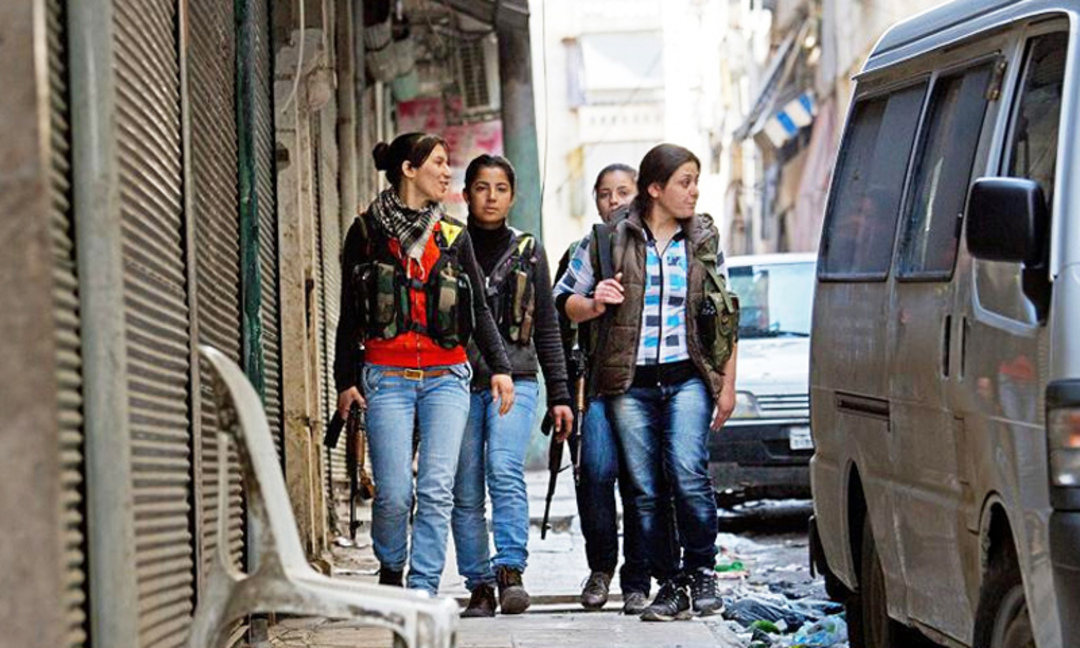-
Kurdish Neighborhoods in Aleppo... Security Responsibility Remains in the Hands of Their Local Forces
-
Despite not specifying a clear timeline, the agreement's terms include the withdrawal of Kurdish forces while maintaining local internal security, reflecting an attempt to achieve a delicate balance b

The Syrian presidency announced a new agreement with the Civil Council for the predominantly Kurdish areas of Sheikh Maqsoud and Ashrafiyeh in Aleppo, less than a month after the signing of a historic agreement between President Ahmad al-Shara and Syrian Democratic Forces commander Mazloum Abdi.
The new agreement includes 14 points and is considered an extension of the previous understanding between Damascus and the "SDF," whose most prominent components are the People's Protection Units (YPG) and Women's Protection Units (YPJ).
These units have controlled the Sheikh Maqsoud and Ashrafiyeh neighborhoods for years, which previously formed an area of dispute between Kurdish forces and the Syrian regime, especially during attacks launched by the armed opposition on Aleppo.
A senior Kurdish official in the Autonomous Administration of North and East Syria confirmed that "the agreement entered into force immediately upon signing, despite the absence of a specific timeline for implementing all its terms."
Badran Jia Kurd, a member of the Autonomous Administration's negotiating delegation with Damascus, explained that "the focus now is on establishing joint mechanisms and committees to ensure smooth implementation of the agreement."
He indicated that "the People's and Women's Protection Units will withdraw from the two areas and head to areas east of the Euphrates, while security responsibility remains in the hands of local internal security forces."
He also denied any presence of Syrian regime forces in Sheikh Maqsoud and Ashrafiyeh under this agreement, which will remain in effect until a comprehensive agreement is reached between Damascus and the "SDF" regarding the latter's areas of influence.
Among the most prominent terms of the agreement:
Recognition of the Kurdish specificity of the two areas.
Preservation of existing civil institutions.
Release of detainees.
Facilitating movement between Kurdish areas in Aleppo and "SDF"-controlled areas in northeastern Syria.
This agreement comes at a time when differences remain between the Kurdish Autonomous Administration and the Syrian regime, where the Syrian Democratic Council (the political umbrella of the "SDF") criticized the formation of the recent Syrian government and the constitutional declaration, considering that they "do not take into account diversity in Syria."
While the current agreement is seen as a step toward reducing tension, the question remains about the parties' ability to achieve a permanent settlement that meets Kurdish demands.
You May Also Like
Popular Posts
Caricature
BENEFIT Sponsors BuildHer...
- April 23, 2025
BENEFIT, the Kingdom’s innovator and leading company in Fintech and electronic financial transactions service, has sponsored the BuildHer CityHack 2025 Hackathon, a two-day event spearheaded by the College of Engineering and Technology at the Royal University for Women (RUW).
Aimed at secondary school students, the event brought together a distinguished group of academic professionals and technology experts to mentor and inspire young participants.
More than 100 high school students from across the Kingdom of Bahrain took part in the hackathon, which featured an intensive programme of training workshops and hands-on sessions. These activities were tailored to enhance participants’ critical thinking, collaborative problem-solving, and team-building capabilities, while also encouraging the development of practical and sustainable solutions to contemporary challenges using modern technological tools.
BENEFIT’s Chief Executive Mr. Abdulwahed AlJanahi, commented: “Our support for this educational hackathon reflects our long-term strategic vision to nurture the talents of emerging national youth and empower the next generation of accomplished female leaders in technology. By fostering creativity and innovation, we aim to contribute meaningfully to Bahrain’s comprehensive development goals and align with the aspirations outlined in the Kingdom’s Vision 2030—an ambition in which BENEFIT plays a central role.”
Professor Riyadh Yousif Hamzah, President of the Royal University for Women, commented: “This initiative reflects our commitment to advancing women in STEM fields. We're cultivating a generation of creative, solution-driven female leaders who will drive national development. Our partnership with BENEFIT exemplifies the powerful synergy between academia and private sector in supporting educational innovation.”
Hanan Abdulla Hasan, Senior Manager, PR & Communication at BENEFIT, said: “We are honoured to collaborate with RUW in supporting this remarkable technology-focused event. It highlights our commitment to social responsibility, and our ongoing efforts to enhance the digital and innovation capabilities of young Bahraini women and foster their ability to harness technological tools in the service of a smarter, more sustainable future.”
For his part, Dr. Humam ElAgha, Acting Dean of the College of Engineering and Technology at the University, said: “BuildHer CityHack 2025 embodies our hands-on approach to education. By tackling real-world problems through creative thinking and sustainable solutions, we're preparing women to thrive in the knowledge economy – a cornerstone of the University's vision.”
opinion
Report
ads
Newsletter
Subscribe to our mailing list to get the new updates!






















